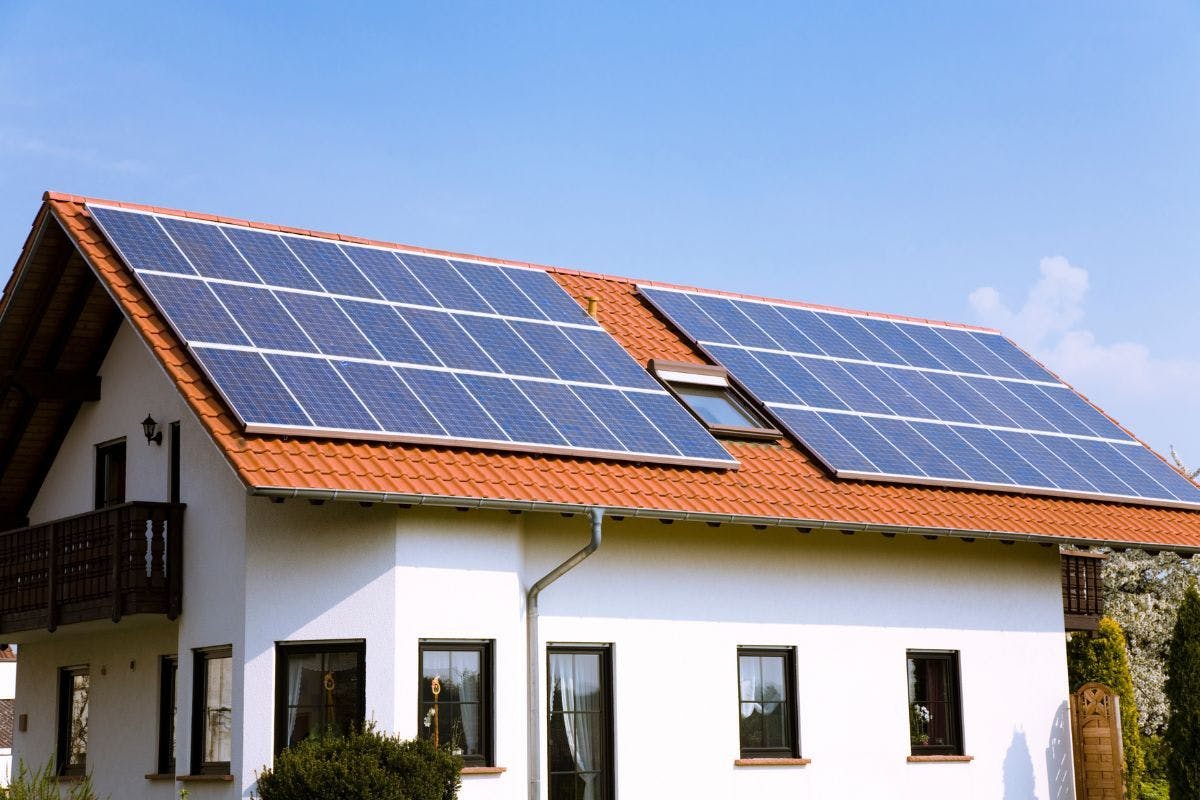SRECs: Solar Renewable Energy Credits and You
Last edited
Author
Andrew Blok
Electrification and Solar Writer and Editor
Editor
Ryan Barnett
SVP, Policy & New Market Development

When you have home solar panels, whenever the sun’s out, you’re generating clean, renewable energy, right from your roof. In some states, energy producers — like utilities — need to generate a certain amount of their electricity from solar panels and want the opportunity to pay you for yours. Enter the SREC.
Solar renewable energy credits (or certificates) represent the fact that a certain amount of renewable energy has been added to the grid.
If you own your panels, you can sell them to speed up your solar payback period. Here’s what you need to know.
See how much you can save by going solar with Palmetto
What Are Solar Renewable Energy Credits (SRECs)?
Solar renewable energy credits, also known as solar renewable energy certificates, are a way to sell the renewable benefits created by solar power, and create a market for those benefits. SRECs quantify and verify how much solar electricity a home or business produces and allows utilities to pay for that solar production.
One SREC represents 1,000 kilowatt-hours (kWhs) or 1 megawatt-hour (MWh) of solar electricity generated.
SRECs help utility companies and power plants meet clean energy goals and renewable portfolio standards. Where SREC markets exist, SRECs can be an additional revenue stream for solar panel owners.
If you lease your solar panels through Palmetto LightReach or other third-party owners, any RECs and SRECs they generate will likely go to the third-party owner of them. While you won’t directly receive the value from SRECs, companies can use them and other incentives to lower the cost of your lease.
Who Buys and Sells SRECs?
Not all states have SREC markets, only those with renewable portfolio standards and sometimes the states bordering them.
Renewable portfolio standards require utility companies to produce a certain percentage of their energy from renewable energy sources. If they can’t generate the electricity themselves, utilities can purchase SRECs as proof they paid someone, including people with home solar panels, to produce that renewable electricity.
With SRECs, the utility is essentially buying the exclusive right to count someone else’s clean energy production from solar panels as their own. Often SRECs can only be bought and sold in the state they were generated in, but sometimes states allow SRECs from neighboring states.
Some solar companies, financing companies, electricity suppliers, and related industry organizations also purchase SRECs upfront from solar panel system owners to reduce up-front installation costs and sell the credits once they have been created.
See how much you can save by going solar with Palmetto
What Is an SREC Worth?
SREC prices vary by state and supply and demand. States with renewable portfolio standards with higher requirements for solar energy typically have higher SREC prices.
Two factors determine the SREC prices:
- Supply and demand: The relationship between the amount of SRECs people create, and the amount of SRECs utilities need to buy.
- Solar alternative compliance payment (ACP): ACP is a tax or penalty created to ensure a utility company meets the state’s renewable energy goals. If the utility company doesn’t buy enough credits, they must pay the ACP. The upper limit of an SREC’s price is usually the same or similar to the ACP.
SREC values can depend on how it’s sold, either on the spot market or by contract. With a spot market, credits are sold every month, or every quarter, for their current value. With a contract, the solar system owner locks in a fixed price per SREC for a multi-year period.
Spot market prices are generally higher, but they can fluctuate, while sales on a contract have lower valuations, but the earnings are more consistent over the contract period.
In general, SREC prices are on the decline, as supply grows, but the renewable portfolio standards that create demand are not increased. An average-size residential solar panel system can generate 10 or so credits per year. However, as mentioned, this SREC value can change significantly depending on many factors.
How Do I Sell SRECs?
SRECs are bought and sold on markets.
Utility companies want to minimize their costs, so they want to purchase SRECs from the fewest number of sellers possible. As a result, the easiest way for homeowners to sell SRECs are through brokers that aggregate and sell SRECs to utilities.
SREC markets don’t exist in every state, but they do in Delaware, Illinois, Kentucky, Maryland, Massachusetts, New Jersey, Ohio, Pennsylvania, Virginia, Washington, D.C., and West Virginia.
How Does the SREC Market Work?
SRECs are commonly bought and sold online through an intermediary, or an SREC aggregator. Top platforms for buying and selling SRECs include SRECTrade, Sol Systems, and Knollwood Energy.
An SREC is first sold by renewable energy producers, and can then be aggregated and traded by energy industry brokers, retail electric providers, and utility companies. This creates a market for those certificates and gives them value.
Homeowners and businesses can sell certificates directly to utilities or through aggregators. However, most utilities prefer to buy a large number of credits through a single aggregator, instead of buying small quantities of credits from a large number of individual producers.
SRECs and RECs: What Is the Difference?
A renewable energy certificate (REC) represents the environmental benefits associated with one MWh of electricity generated from renewable energy, including solar and wind. Each REC is a legal claim the electricity came from 100% renewable energy sources.
A solar renewable energy credit (SREC) takes things a step further by confirming that 100% of the energy used to make that clean electricity came from solar power. Because some states have defined solar generation requirements in addition to renewable energy generation requirements, the certificates help keep track of solar electricity.
| SRECs | RECs |
|---|---|
| Specific to solar energy | Generated by more types of renewable energy |
| Can earn solar owners money in certain states | Can earn solar owners money in certain states |
| Value can vary over time and by market | Value can vary over time and by market |
If you’re interested in using solar energy to power your home and want to know if SRECs can help you save even more money, see what solar panels could save you.
See what solar can do for you:
Frequently Asked Questions
How much are SRECs worth?
The value of SRECs varies with supply and demand. That means they are worth different amounts depending on the state they’re sold in and when they’re sold.
How do SRECs work?
Utility companies buy SRECs to fulfill their legal obligations to source a certain amount of solar energy. Solar panel owners in areas with SREC markets can sell the SRECs their solar panels generate and earn a bit more money.
Do you get SRECs if you have a solar lease or power purchase agreement (PPA)?
While details of leases vary, typically, no. The owner of the solar panels gets to claim any SRECs, in this case, the leasing company. If you’re a Palmetto LightReach customer, LightReach owns all incentives including the SRECs as outlined in your agreement. LightReach is able to pass along the benefits to you through reduced pricing, and you don’t have to worry about any of the paperwork or slowly waiting for checks as the system produces each SREC (or 1,000 kWh).
Disclaimer: This content is for educational purposes only. Palmetto does not provide tax, legal, or accounting advice. Please consult your own tax, legal, and accounting advisors.


